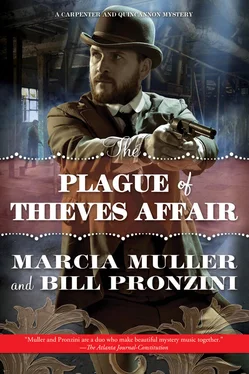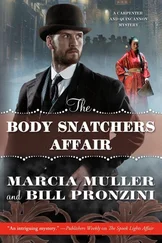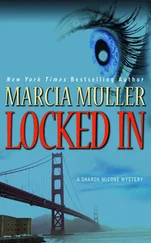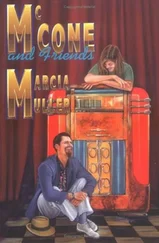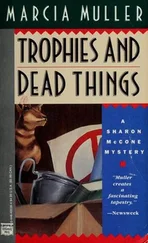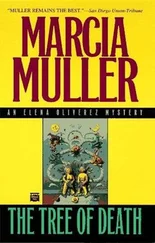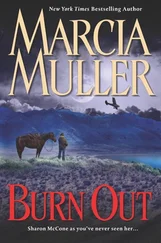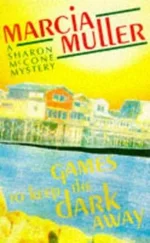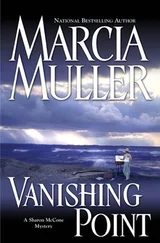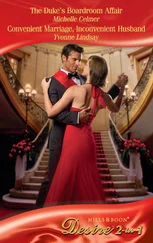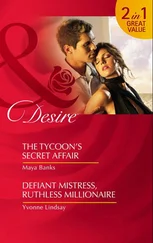Sight of the steadily pointed weapon froze Sabina. She could have kicked herself for not anticipating the possibility that Octavia Fairchild might have come here armed. Both her hands were clutching the desk edge; she let the right one slide off slowly, move downward to the partially open middle drawer.
“But you’ll never tell anyone!” the woman cried. “You’ll be as dead as Roland and no one will believe that lunatic Charles!”
Sabina’s heart skipped a beat as her fingers touched the Remington derringer. Could she draw and fire it in time to save her life?
She was never to know the answer. For in that moment, the alcove door flew open and out, bless him, came that lunatic Charles.
What happened next came so swiftly that it was almost a blur. He entered the office in a rush, his blackthorn stick upraised and flicking the air. Octavia Fairchild swung toward him, but she had no time to fire her pistol. In two slashing strokes Charles disarmed her: the first smacked her wrist and elicited a sharp cry of pain, the second, driven up underneath, popped the pistol free of her grasp and into an arc that allowed him to catch it deftly in midair with his free hand.
“Lunatic, indeed!” he snapped indignantly. “Charles, indeed! Holmes is the name, Sherlock Holmes, acknowledged expert at singlestick” — he waggled the blackthorn for emphasis — “as well as the use of sword, riding crop, and baritsu .”
Sabina sank down into her chair; she had faced a handgun twice before in her years as a detective, but in neither instance had she come so close to being shot, and her knees were understandably a little shaky. Edward Boone, who had also emerged from the alcove, stood gawping at Charles. So did Octavia Fairchild, clutching her wrist and grimacing in pain, but only for a few seconds. Then, all at once, she melted completely. Collapsed to the floor and puddled there, her face buried in her arms, tears of self-pity staining the sleeves of her brand-new muskrat coat.
“Now then,” Sherlock Holmes said, “I will summon the police and finis will be written to, as the good Doctor Watson might have it, the Adventure of the Wronged Detective.”
It was evening when he returned to the city. His arrival at the Ferry House would have been much later if he hadn’t been fortunate in boarding the last southbound train just as it was leaving Los Alegres and then the ferry just as it was departing Sausalito.
He’d had plenty of time on the trip to decide on a way to accomplish the final phase of his mission. The one he settled on required immediate action, which meant postponing the night’s rest his body craved after the long, wearying day. It also required breaking of the law (though only technically, in his view), and its success depended on his powers of persuasion and a not inconsiderable amount of luck. The risk bothered him not at all — he didn’t exactly thrive on danger, but neither did he shy away from it — and it was the only method of recovering the stolen steam beer formula that did not involve violence. Besides which, if it could be accomplished it would provide an added element of satisfaction to the closing of the Golden State case.
Outside the Ferry House he boarded a Market Street trolley and rode it to Fourteenth Street. From there he walked three blocks and turned onto Capp, a narrow residential street that contained facing rows of modest Victorian Stick — style houses. Light showed in the front windows of the fifth in the row on the south side. This one had been occupied by Slick Fingers Sam Rigsby and his wife for the past dozen or so years — except, that was, for the three years Slick Fingers had spent in Folsom Prison. It had been more than twelve months since Quincannon had had any contact with the man; if providence was with him, the Rigsbys would still be in residence.
It was and they were. The door was opened in answer to his turn of the bell by Anna Rigsby, a middle-aged harridan with the face of a dyspeptic mule and a disposition to match. Her mouth pinched into a lemony pucker when she recognized him. Her obvious dislike stemmed from the fact that Quincannon had been responsible for the three years her husband had spent as a guest of the state. Slick Fingers, on the other hand, held no grudge. Quincannon had spoken on his behalf at his trial, requesting leniency because Rigsby had been coerced by his two partners into taking part in the abortive bank caper, and as a result the judge had imposed the minimum sentence.
“Oh, it’s you, is it,” she said. “Don’t tell me you’re here to arrest Rigsby again?”
“On the contrary. Is he home?”
“What do you want with him?”
“A private conversation on a matter beneficial to both of us.”
“Hah. Double-talk. Say it out plain or you don’t come in.”
“An offer of money — a sizable sum if he accepts a proposition I have for him. Plain enough?”
Her eyes took on an avaricious glitter. “Plain enough,” she said, and stood aside. Then, when Quincannon had entered the vestibule, “He’s in the back bedroom working on another of his fool gadgets. Down the hall there, second door on the right.”
The house smelled of a none-too-pleasant blend of boiled cabbage, cooked fish, dust, and dry rot. Mouth-breathing, he went along the hallway, the floorboards creaking ominously under his weight. The second door on the right stood ajar; he pushed it inward and stepped through.
“Good evening, Slick Fingers.”
Rigsby was seated at a table on which was spread an array of tools, a soldering iron, metal rods and plates of various sizes, and other objects which Quincannon neither could nor cared to identify. Slick Fingers, in addition to his primary source of income, fancied himself an inventor. He tinkered continually with this or that mysterious contraption, none of which, so far as Quincannon knew, had ever earned him a dime.
He looked up, registered startlement and flickers of anxiety, started to stand, changed his mind, and sighed gustily as he sank back in his chair. A slender gent of some fifty hard-lived years, he had two distinguishing features: protuberant jumbo ears and large hands with long, spatulate fingers, both of which figured prominently in the plying of his chosen trade. He regarded Quincannon in a wary, defeated way, the expression of a man expecting to hear the voice of doom.
“I ain’t done nothing,” he said, his nervousness and his shifty gaze belying the words. “No box jobs since I got out of Folsom. I learned my lesson, I’m out of the game for good. Handyman work now when I can get it, that’s all until I sell one of my inventions. Clean as a whistle.”
“You needn’t try to snow me. Once a box man, always a box man. And still the best in the business, I’ll wager.”
Slick Fingers almost but not quite managed to conceal his pride at the compliment. “What is it you want, Mr. Quincannon?”
Quincannon shut the door behind him before he answered. “Your expertise and a few hours of your time, in order to right a wrong. For which you’ll be well paid.”
“I don’t see what— Wait a minute. You ain’t here to offer me a box job?”
“That’s precisely why I’m here.”
“What kind? Legit?”
“Not exactly.”
“You mean you want me to crack a safe and steal what’s in it?”
“Something in it, yes.”
Slick Fingers shook his head, as if the proposition had rattled his senses. “Geez,” he said, “I never figured you for a thief.”
Quincannon winced, recalling his righteous thought in Caleb Lansing’s rooms that he was many things but a thief wasn’t one of them. “Extenuating circumstances demand it,” he said, as much in self-defense as explanation to Rigsby. A man was not a thief, after all, if he had no intention of realizing illegal profits from the commission of an unlawful act.
Читать дальше
